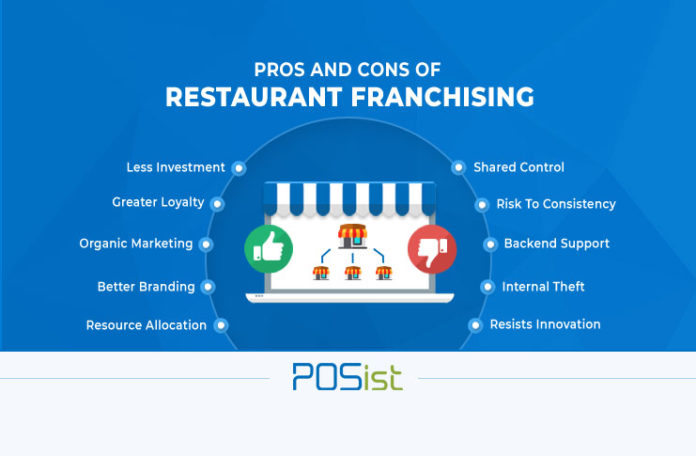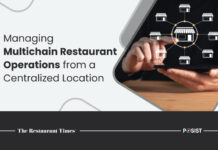Restaurant expansion is something that every restaurateur inevitably looks forward to and works for. The aim of any business is to expand its operations and create profits. Restaurants are no exception, but when the time of expansion comes, restaurateurs hardly know how to scale their business. Different expansion methods are suitable for different circumstances. One of the most common ways of expanding is through restaurant franchising, and here is a definitive guide that will help you do so.
Every type of expansion will have its pros and cons, and as a businessman, the restaurateur needs to be aware of these and apply them to his/her present circumstance to deduce what expansion method is most suitable for the restaurant. Many people are under the impression that franchising is not a suitable expansion method for a restaurant while there are those who believe that restaurant franchising is the way the future of expansions in the restaurant space is heading. While there are several restaurant franchise advantages, there are several disadvantages as well. Here’s our take on the franchise debate is to understand the basis of the method and then compare the pros and cons. If you are looking forward to opening a franchise restaurant, this article is for you!
What is Restaurant Franchising?
A franchise in simple terms is a brand that an investor (Franchisee) has bought the right to use. The brand is established by the parent restaurant, the operations and running of the restaurants is fixed by the Franchisor (Parent restaurant), and the Franchisee simply uses the brand name to earn a profit. While the Franchisee runs the day to day operations, the bigger decisions like the method of training, location and the kind of technology to use are up to the Franchisor. It is a contractual relationship with pre-defined norms and authority structures which define how the franchise is run. There are many franchise models that you can choose to go ahead with.
There may be many reasons a restaurateur may or may not chose to expand through restaurant franchising. To delve deeper into this choice, we compare the pros and cons of expansion through franchising for restaurants.
Pros Of Expanding Through Restaurant Franchising
When a restaurant is looking to expand, restaurant franchising is definitely one of the most viable options available. The reason that this trend has picked up is that it comes with distinct advantages for the Franchisor. Here are some restaurant franchise advantages that will make you consider investing in a franchise:-
1. Less Capital Investment
Restaurant franchising saves the Franchisor an otherwise massive amount of capital investment required for setting up an outlet. If a restaurant decides to not a franchise, the capital investment made would not only include all the fixed costs and operational costs until break even but also increase the risk. As the sole investor, you will either have to fund the expansion yourself or take a loan which will increase your liability and reflect on your costs and ability to reach break-even as well. Opening a franchise restaurant requires less capital as compared to a stand-alone restaurant.
Restaurant franchising eliminates this problem as now the Franchisee needs to buy the right to use your brand for a royalty fee. This creates an income for you. Moreover, a part of the investment is shared by the Franchisee which not only relieves you from most of the financial burden but also enables the restaurant to function smoothly at minimum debt liability, making it a wise decision for both the Franchisee and the brand in the longer run.
2. Greater Loyalty
Franchisees are not just people working for you but contractual business partners in their own right. By taking a franchise, they enter a contract of limited ownership of your brand. This means that they will treat the restaurant as their own, given that they are investors in it. Thus, a greater commitment and loyalty towards the Franchisor restaurant is established. The sense of ownership and desire for well being of the restaurant is higher in the franchise owner as compared to a manager that you would have hired had you not chosen to expand through franchising.
3. Bigger Brand Presence
Restaurant franchising is considered to be the easiest way of scaling your brand if you want to do it quickly. Franchising allows you to take multiple locations at once because not all resources being exhausted are your own. This creates your restaurant presence in multiple cities and even in various areas of the same city. Greater visibility and broader reach enhance the brand presence is not just a physical space but the minds of your target audience as well. The fact that the restaurant name and brand will be familiar to your target audience will create an influx of sales. Not only will franchising help you reach your potential customers faster and in a more cost-effective way, but also create your presence in their minds increasing their loyalty towards your outlet.
4. Greater Organic Marketing
In today’s restaurant space, new restaurants are popping up daily. In this scenario, a good marketing plan can make or break your restaurant but marketing in itself is expensive and the most paying form of marketing is organic marketing. When your restaurant reaches potential customers organically, i.e through sources like word of mouth, the effects are far greater than those of paid marketing. Organic marketing is free of cost but on the downside, it is challenging to execute.
When you expand your restaurant through franchising, you create a network of people who will do your organic marketing for you. This is the network of your Franchisees. As said earlier, the ownership that the Franchisee will feel is far superior to the ownership that a hired manager will feel. Because of this, franchise owners are more inclined to talk about the restaurant and encourage those in their immediate circle at least to visit it. This creates a flow of word-of-mouth marketing. Also, given that franchise expansions are mostly in untapped markets of different towns, it creates a base for your marketing plan and familiarizes your restaurant among the locals.
5. Better Resource Allocation
As mentioned earlier, expanding through franchising frees a great number of resources from the franchisor’s end. As a Franchisor, this will allow you to better allocate these freed resources in the business. With the money you save on expansion, you can upgrade your technology, enter product innovation or even consider better marketing options. Your limited resources can be put to better use as the burden of expansion is shared by the franchisee who will also handle day to day operations on your behalf.
Cons of Expanding Through Restaurant Franchising
All this being said, there are also reasons that prompt people to not go for restaurant franchising when it comes to expansion. In an ideal scenario, restaurant franchising seems like a one-stop solution to major expansion problems, but in reality, there are many loopholes in the system. This brings us to the cons of restaurant franchising.
It is true that as investors and contractual owners of the brand, a sense of ownership is established which is good for your brand, but at the same time, it means that you need to dilute the amount of control that you share over the brand. Decisions can no longer be taken by you alone. As investors in your brand, your franchise owners will also have their own point of view with which the will run the business from their end. You can not control everything in the restaurant as you used to and you will have to listen to the Franchisee owners as well since they are stakeholders in your business operations. This means that your control over the workings of the restaurant will be highly diluted and decision making can be a slow and time as well as resource consuming process.
2. Risk of Losing Consistency and Brand Dilution
Once you let your restaurant out as a Franchisee, you can no longer oversee the operations as you used to in your restaurant. This can create gaps which reflect upon the taste and quality of food or the level of service. Expansions in the restaurant industry are essential as well as risky because restaurants run on the consistency of their food and service. If the food at one outlet is very different from the other, it will create a distrust and confusion in the minds of the customer and you will lose out on not just sales but the customers themselves. When expansions happen through company-owned stores, this problem does not arise, but in a franchise model, it is very easy to lose the consistency of the product and/or service leading to a loss of customers and a dilution of your brand.
3. Having the Back-End Responsibility
While the responsibility for day-to-day operations is significantly decreased in a franchise model, back-end responsibility stays the same. As a Franchisor, you will still have to give the Franchisee full technological support. The responsibility of constructing the restaurant, choosing the location, providing machinery, devising marketing plans, designing the menu, etc. will all be under the umbrella of your duties. When the store is company-owned, you have both an inside view of operations and a vantage view, but in a franchise model, some inside view is blocked, making your job just as difficult. Moreover, your brand consistency is to an extent based on these back-end operations which makes managing these just as tricky.
4. Increased Risk of Internal Theft
While it is true that a sense of ownership is established in the franchise model which should ideally make the owners that much more vigilant to ensure the success of the restaurant, the reality is far from ideals. It is very easy for owners or staff members of a franchise to steal from the parent restaurant. These thefts are so deftly done that without a sophisticated POS with an anti-theft feature, it would be nearly impossible to catch onto this internal scam. According to a report by the National Restaurant Association, theft represented on average 4% of a restaurant’s total food costs. What is more, this issue with internal thefts is not a one-time thing. While every restaurant goes through it, the ease of theft that the franchisee model offers parallels no other.
5. Difficult To Freely Innovate In
As said earlier, in a franchise model, responsibility and ownership are shared so you may think that same is the case with goals in the restaurant business. Once more ideally true, practically his is a rare case. As the owner of the franchise, the goals of the investor will be to increase his profits which is what he earns out of. As the Franchisor, your goal will be the long term well being of the restaurant. These goals while may seem to be on the same line are prone to crashing as you innovate. When innovations are being done, it is expected for profits to go down a little and then pick up in the longer run. A franchise owner will never want to take such a project which will create internal managerial clashes and hinder your innovative space.
Not just franchising, every expansion method will have its shares of positives and negatives. While the best way for your restaurant depends upon a number of factors, carefully comparing each is necessary for making an informed decision with a calculated amount of risk. Hope this list of pros and cons will solve your dilemmas regarding restaurant franchising.


















What is the advantage of franchising a restaurant industry?
I always had a presumption that opening a franchise is a beneficial move but restaurant franchise cons are also there.
thank you for this article it has show me the other side of the coin!
Today, restaurant franchises continue to rank in the top ten of the most popular franchise opportunities on the market, making them great business ventures to cash in on their popularity and revenue-generating possibilities. It is one of the best articles that I have read about the franchise business.
Restaurant franchising is a great option if you want to expand quickly. If you have set enough standards, I dont think brand dilution should be a problem.
Thanks for this wonderful tips, this will now help me to manage my business well.